Although eight of UB’s 13 deans were internal candidates promoted from within the university – including three current interim deans – the first search committee meeting for the next dean of the College of Arts and Sciences Wednesday afternoon centered around discussions of an external search.
The search committee held its initial meeting in Baird Hall Wednesday to hear suggestions from faculty about what they want to see in a new dean. The College of Arts and Sciences is currently looking to replace E. Bruce Pitman, who announced in October that he will be stepping down as dean at the end of the academic year.
Co-chairs of the committee, Robert Shibley, dean of the School of Architecture and Planning, and Diana Aga, a chemistry professor, ran the meeting. They spoke to faculty about what they were looking for in a new dean and how the process is going to work when it comes to finding the right person. The committee hopes to have a new dean in place before the fall semester begins.
Though the committee will be advising the search, no decisions will be made without provost and presidential approval.
“The search committee is advisory to the university’s senior leadership,” Shibley said. “They will be making the decisions. We recommend with the strengths and limitations as we understand them through a process of screening an ultimately short list of 15 and narrowing it down from there to four or five.”
Shibley is optimistic about the search and hopes that, with the help of the faculty, the committee will be able to find someone who can encompass all the elements of the college. The school ranges from the sciences to the humanities.
“Diversity is a core issue – this is based strongly on the initial meeting of the search committee and emphasized in the charge by our provost,” Shibley said. “It is clearly an expression of UB’s values about the role of diversity.”
The committee will be updating faculty at their meetings about the types of candidates they are speaking to, without using names, as to maintain the confidentiality of the search.
Robert Burkard, a professor and chair of the Department of Rehabilitation Sciences, was the only faculty member present who was outside the College of Arts and Sciences. He spoke frequently about what he felt would make a good dean for the college.
“Pitman [and previous other deans] were pretty instrumental in helping us with interprofessional education and practicing as a group. The university has verbally supported that initiative and not fiscally supporting it, it would be nice to have a dean that understood the value of working in teams,” Burkard said.
Multiple professors spoke up at the meeting, utilizing the opportunity to voice their concerns.
Jeffrey Errington, a chemical and biological engineering professor and associate dean for undergraduate education, values financial ingenious, in light of issues in the past.
“The department has it’s own set of financial complexities that we’ve looked at with the dean, how difficult the financial situation it is and how indirect the dealings were in order to get things accomplished,” Errington said. “I think we really need to look for someone who has a good financial intuition.”
Errington also noted that he had a hard time reaching the dean in the past, which was he said was frustrating when it comes to finances as well as other aspects when seeking assistance.
Other professors commented on the need for a dean who can include all departments well – focusing not on one but on the collective need of the college.
Barbara Bono, an associate English professor, spoke about the way that the college used to be and how it’s changed over time.
“It was great when we came together and had a lot of smaller internal dealings with each other and it was a model of strength,” Bono said. “I would like a model of strength that also engages us strongly with the professional schools, with them respecting us and us respecting them.”
Bono also critiqued the way that communication works within the department and calls for comradary amongst faculty. She refers back to a time when culture and intellectual leadership were abound, and hopes to find someone who will bring back this energy.
Jim Lawler, an associate philosophy professor, sat amongst others in his department and spoke about what the university can do with the resources they already have.
“We work with the alumni and I think they’re really under-utilized here,” Lawler said. “Our alums are out there to help with recruiting, helping with publicity and funding from the faculty.”
The search committee is going to continue holding meetings for the faculty in order to update and inform anyone interested in the process.
Tori Roseman is the senior features editor and can be reached at tori.roseman@ubspectrum.com.





